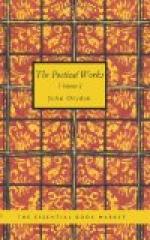At home the hateful names of parties
cease,
And factious souls are wearied into peace.
The discontented now are only they
Whose crimes before did your just cause
betray:
Of those, your edicts some reclaim from
sin,
But most your life and blest example win.
Oh, happy prince! whom Heaven hath taught
the way,
By paying vows to have more vows to pay!
Oh, happy age! oh times like those alone,
320
By fate reserved for great Augustus’
throne!
When the joint growth of arms and arts
foreshow
The world a monarch, and that monarch
you.
* * * * *
FOOTNOTES:
[Footnote 16: ‘Ambitious Swede:’ Charles X., named also Gustavus, nephew to the great Gustavus Adolphus.]
[Footnote 17: ‘Iberian bride:’ the Infanta of Spain was betrothed to Louis XIV.]
[Footnote 18: ‘Otho:’ see Juvenal.]
[Footnote 19: ‘Galba:’ Roman emperor, who adopted Piso.]
[Footnote 20: ‘Famous grandsire:’ Charles II. was grandson by the mother’s side to Henry IV. of France.]
[Footnote 21: ‘With alga,’ &c. : these lines refer to the ceremonies used by such heathens as escaped from shipwreck. Alga marina, or sea-weed, was strewed about the altar, and a lamb sacrificed to the winds.]
[Footnote 22: ‘Portumnus:’ Palaemon, or Melicerta, god of shipwrecked mariners.]
[Footnote 23: ‘Booth’s:’ Sir George Booth, an unsuccessful and premature warrior on the Royal side in 1659.]
[Footnote 24: ‘Fougue:’ a French word used for the fire and spirit of a horse.]
[Footnote 25: ‘Schevelin:’ a village about a mile from the Hague, at which Charles II. embarked for England.]
[Footnote 26: ‘Naseby:’ the ship in which Charles II. returned from exile.]
[Footnote 27: ‘Great Gloster:’ Henry, Duke of Gloucester, third son of Charles I., landed at Dover with his brother in 1660, and died of the smallpox soon afterwards.]
[Footnote 28: Charles entered London on the 29th of May.]
[Footnote 29: ‘Star:’ said to have shone on the day of Charles’ birth, and outshone the sun.]
* * * * *
TO HIS SACRED MAJESTY.
A PANEGYRIC ON HIS CORONATION.
In that wild deluge where the world was
drown’d,
When life and sin one common tomb had
found,
The first small prospect of a rising hill
With various notes of joy the ark did
fill:
Yet when that flood in its own depths
was drown’d,
It left behind it false and slippery ground;
And the more solemn pomp was still deferr’d,
Till new-born nature in fresh looks appear’d.
Thus, Royal Sir, to see you landed here,
Was cause enough of triumph for a year:




